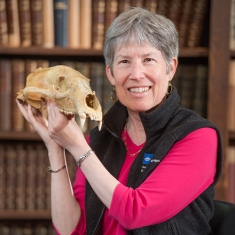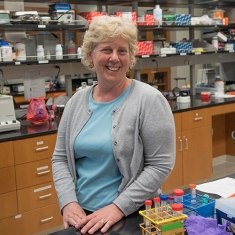The Department of Biological Sciences maintains an active graduate program leading to the master of science degree in biological sciences and offers opportunities for original work in a wide variety of fields, including animal behavior, biochemistry, cell and developmental biology, ecology, environmental science, evolutionary biology, genetics, marine biology, microbiology, molecular biology, neurobiology, plant sciences and physiology.
The program of study emphasizes independent research supported by advanced coursework. Candidates are expected to demonstrate a strong background in the life sciences and a clear commitment to independent laboratory, field and/or theoretical research.
New applications are due by January 15 each year for admission at the start of the subsequent fall semester.
Program Director: Jesse Bellemare
Before applying, potential applicants should contact two or three faculty members who might be appropriate advisers based on overlap of applicant and faculty research interests. Identification of appropriate laboratories for applicants will help in the application process, as new students will need to be matched with potential faculty mentors. Because of the emphasis on laboratory-based learning in the master’s program, identifying an adviser early on also enables students to start their research soon after arriving at Smith College.
Applicants should plan to submit their application packets, with all required materials, by the January 15 deadline.
If you have questions about the application process, please contact the Office of Graduate & Special Studies or Biological Sciences Master’s Program Director Professor Jesse Bellemare.
The Biological Sciences Master’s Program is fully funded: accepted students receive a tuition waiver and an academic year stipend in exchange for work in the department as a teaching fellow assisting with laboratory courses. Students are also eligible for summer stipends and research support.
For more information on tuition and fees, visit the graduate admission site.
The master’s program in biological sciences continues and enhances the undergraduate foundation of a number of academic disciplines, including biology, biochemistry, neuroscience, and environmental science and policy. This program focuses on modern methods in both laboratory and field research and requires students to design and implement a thesis demonstrating sophisticated experimental and conceptual approaches to substantive questions in the biological sciences.
Over the course of the program, students are expected to develop:
- A deep knowledge of a life sciences subdiscipline through a faculty-mentored research project.
- The ability to think critically and design rigorous experiments.
- The ability to collect, organize and analyze data.
- Laboratory and/or field research skills using sophisticated instrumentation.
- Read, synthesize and critique primary research articles in their field.
- Enhanced skills in writing and public speaking through presentations in classes, campus research symposia and at regional or national scientific meetings.
With a rich array of courses and access to extensive research resources, graduate students in biological sciences reinforce and expand their knowledge and the experience they need to continue successful careers in the life sciences.
Prerequisites
Applicants to the Biological Sciences Master’s Program are normally expected to have majored in biological sciences or a related field, although the department will also consider applicants who have had some undergraduate work in the field but majored in an unrelated field. Prospective students who are in this latter category should address questions about specific details of their academic background to the director (Jesse Bellemare). With departmental approval, students whose undergraduate preparation in biology is incomplete may make up any gaps in their training through course work at Smith College.
Requirements
Once accepted to the program, Smith College requires all master’s students to take a minimum of 32 credits of course work, at least 16 of which must be at the graduate level. Of the remaining 16 credits, no more than eight may be given for intermediate-level (200-) courses. To count toward the degree, all grades received must be a B minus or higher.
Master’s students are required to participate in the graduate seminar (BIO 507) and are expected to undertake a course of study, designed in conjunction with their adviser, that will include appropriate courses both within and outside the department.
Graduate students arrive on campus having already identified a potential adviser and conduct research during both years of their program. This research ultimately results in a thesis that is read and evaluated by the adviser plus two additional readers. A written thesis is required of all students in the master’s program. The degree candidate is also required to present his or her research to the department at the end of the fourth semester in a public thesis defense presentation.
In addition to these formal academic experiences, many graduate students regularly attend one of the several lunchtime seminars that meet weekly with presentations on topics in the biological sciences. The graduate committee also strongly recommends that each graduate student present either a journal article or research update, at least once a year, in an appropriate forum such as one of the lunchtime seminars.
In addition to the courses listed below, graduate students can take courses at the other schools participating in the Five College Consortium, including the University of Massachusetts.
In consultation with the graduate adviser, master’s students at Smith have ample opportunity to build a challenging and appropriate graduate program.
Molecular and Cellular Biology
- Colloquium on Molecular Medicine
- Developmental Biology
- Histology
- Immunology
- Introduction to Biological Fine Structure
- Molecular Biology of Eukaryotic Systems
- Molecular Physiology
- Seminar: Molecular Biology (topics vary)
Neurobiology and Behavior
- Animal Behavior
- Cellular and Molecular Neuroscience
- Neuroanatomy
- Neurophysiology
Organismic and Evolutionary Biology
- Biogeography
- Morphology of Algae and Fungi
- Plant Ecology
- Public Policy for Marine and Coastal Resources
- Seminar: Environmental Studies
- Seminar: Evolutionary Biology
Contact
Fax: 413-585-3786
Email: esylvan@smith.edu
Administrative Assistant: Elizabeth Iola Sylvan
Program Director: Jesse Bellemare






















